“The absence of evidence is not the evidence of absence."
| Carl Sagan 1934 - 1996 | |
 |
|
|
Carl Edward Sagan was an American astronomer, astrophysicist, cosmologist,
author, science popularizer and science communicator Carl was famous world wide for bringing us the tv science series Cosmos. This was re produced in 2014 by one of his students Neil de Grasse Tyson.
Cosmos: A Personal Voyage was a thirteen-part television series written by Carl Sagan, Ann Druyan, and Steven Soter, with Sagan as presenter. First episode date: September 28, 1980. Final episode date: December 21, 1980. Theme song: Heaven and Hell, Part I. Writers: Carl Sagan, Ann Druyan, Steven Soter |
|
|
The Pale Blue Dot & Other words of
wisdom from Carl. “Look again at that dot. That's here. That's home. That's us. On it everyone you love, everyone you know, everyone you ever heard of, every human being who ever was, lived out their lives. The aggregate of our joy and suffering, thousands of confident religions, ideologies, and economic doctrines, every hunter and forager, every hero and coward, every creator and destroyer of civilization, every king and peasant, every young couple in love, every mother and father, hopeful child, inventor and explorer, every teacher of morals, every corrupt politician, every "superstar," every "supreme leader," every saint and sinner in the history of our species lived there-on a mote of dust suspended in a sunbeam. The Earth is a very small stage in a vast cosmic arena. Think of the endless cruelties visited by the inhabitants of one corner of this pixel on the scarcely distinguishable inhabitants of some other corner, how frequent their misunderstandings, how eager they are to kill one another, how fervent their hatreds. Think of the rivers of blood spilled by all those generals and emperors so that, in glory and triumph, they could become the momentary masters of a fraction of a dot. Our posturings, our imagined self-importance, the delusion that we have some privileged position in the Universe, are challenged by this point of pale light. Our planet is a lonely speck in the great enveloping cosmic dark. In our obscurity, in all this vastness, there is no hint that help will come from elsewhere to save us from ourselves. The Earth is the only world known so far to harbor life. There is nowhere else, at least in the near future, to which our species could migrate. Visit, yes. Settle, not yet. Like it or not, for the moment the Earth is where we make our stand. It has been said that astronomy is a humbling and character-building experience. There is perhaps no better demonstration of the folly of human conceits than this distant image of our tiny world. To me, it underscores our responsibility to deal more kindly with one another, and to preserve and cherish the pale blue dot, the only home we've ever known.” |
|
| “How is it that hardly any major religion has looked at science and concluded, “This is better than we thought! The Universe is much bigger than our prophets said, grander, more subtle, more elegant?” Instead they say, “No, no, no! My god is a little god, and I want him to stay that way.” A religion, old or new, that stressed the magnificence of the Universe as revealed by modern science might be able to draw forth reserves of reverence and awe hardly tapped by the conventional faiths.” | |
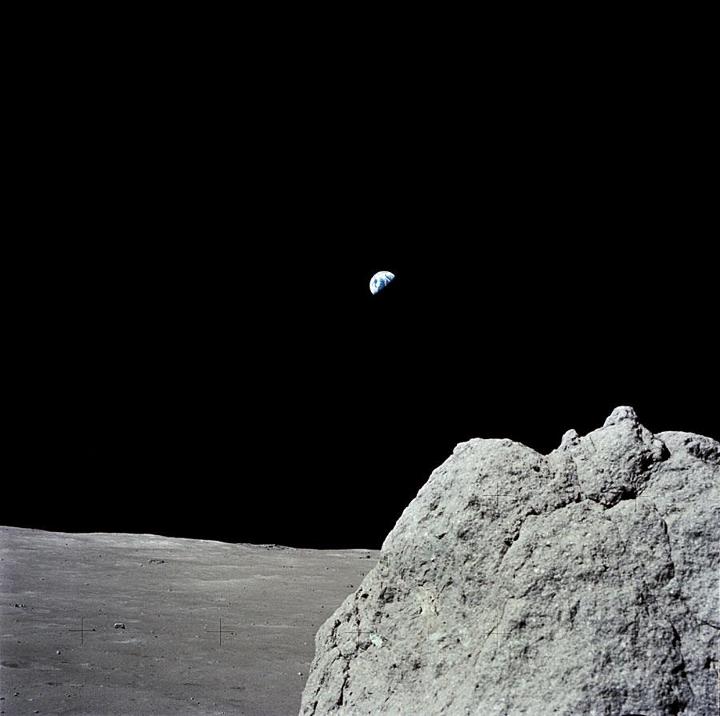 |
|
| “How is it that hardly any major religion has looked at science and concluded, “This is better than we thought! The Universe is much bigger than our prophets said, grander, more subtle, more elegant?” Instead they say, “No, no, no! My god is a little god, and I want him to stay that way.” A religion, old or new, that stressed the magnificence of the Universe as revealed by modern science might be able to draw forth reserves of reverence and awe hardly tapped by the conventional faiths.” | |
|
“Or consider a story in the Jewish Talmud left out of the Book of
Genesis. (It is in doubtful accord with the account of the apple, the
Tree of Knowledge, the Fall, and the expulsion from Eden.) In The
Garden, God tells Eve and Adam that He has intentionally left the
Universe unfinished. It is the responsibility of humans, over countless
generations, to participate with God in a "glorious" experiment - the
"completing of the Creation." The burden of such a responsibility is heavy, especially on so weak and imperfect a species as ours, one with so unhappy a history. Nothing remotely like "completion" can be attempted without vastly more knowledge than we have today. But, perhaps, if our very existence is at stake, we will find ourselves able to rise to this supreme challenge.” |
|
| “The Cosmos extends, for all practical purposes, forever. After a brief sedentary hiatus, we are resuming our ancient nomadic way of life. Our remote descendants, safely arrayed on many worlds throughout the Solar System and beyond, will be unified by their common heritage, by their regard for their home planet, and by the knowledge that, whatever other life may be, the only humans in all the Universe come from Earth. They will gaze up and strain to find the blue dot in their skies. They will love it no less for its obscurity and fragility. They will marvel at how vulnerable the repository of all our potential once was, how perilous our infancy, how humble our beginnings, how many rivers we had to cross before we found our way.” | |
 |
|
| "Think of the rivers of blood spilled by all those generals and emperors so that in glory and in triumph they could become the 'Momentary' masters of a 'Fraction' of a 'Dot' ” | |
| “A blade of grass is a commonplace on Earth; it would be a miracle on Mars. Our descendants on Mars will know the value of a patch of green. And if a blade of grass is priceless, what is the value of a human being?” | |
| “The visions we offer our children shape the future. It _matters_ what those visions are. Often they become self-fulfilling prophecies. Dreams are maps.” | |
| “The immense distances to the stars and the galaxies mean that we see everything in space in the past, some as they were before the Earth came to be. Telescopes are time machines.” | |
 |
|
| “If we continue to accumulate only power and not wisdom, we will surely destroy ourselves. Our very existence in that distant time requires that we will have changed our institutions and ourselves. How can I dare to guess about humans in the far future? It is, I think, only a matter of natural selection. If we become even slightly more violent, shortsighted, ignorant, and selfish than we are now, almost certainly we will have no future.” | |
|
“Planetary exploration satisfies our inclination for great enterprises
and wanderings and quests that has been with us since our days as
hunters and gatherers on the East African savannahs a million years ago.
By chance—it is possible, I say, to imagine many skeins of historical
causality in which this would not have transpired—in our age we are able
to begin again. Exploring other worlds employs precisely the same qualities of daring, planning, cooperative enterprise, and valor that mark the finest in military tradition. Never mind the night launch of an Apollo spacecraft bound for another world. That makes the conclusion foregone. Witness mere F-14s taking off from adjacent flight decks, gracefully canting left and right, afterburners flaming, and there’s something that sweeps you away—or at least it does me. And no amount of knowledge of the potential abuses of carrier task forces can affect the depth of that feeling. It simply speaks to another part of me. It doesn’t want recriminations or politics. It just wants to fly.” |
|
| “I do not think it irresponsible to portray even the direst futures if we are to avoid them we must understand that they are possible. But where are the alternatives Where are the dreams that motivate and inspire We long for realistic maps of a world we can be proud to give to our children. Where are the cartographers of human purpose Where are the visions of hopeful futures of technology as a tool for human betterment and not a gun on hair trigger pointed at our heads” | |
 |
“On Titan the molecules that have been raining down like manna from heaven for the last 4 billion years might still be there largely unaltered deep-frozen awaiting the chemists from Earth” |
| “There is every reason to
think that in the coming years Mars and its mysteries will become
increasingly familiar to the inhabitants of the Planet Earth. Right: Human rubbish on Mars |
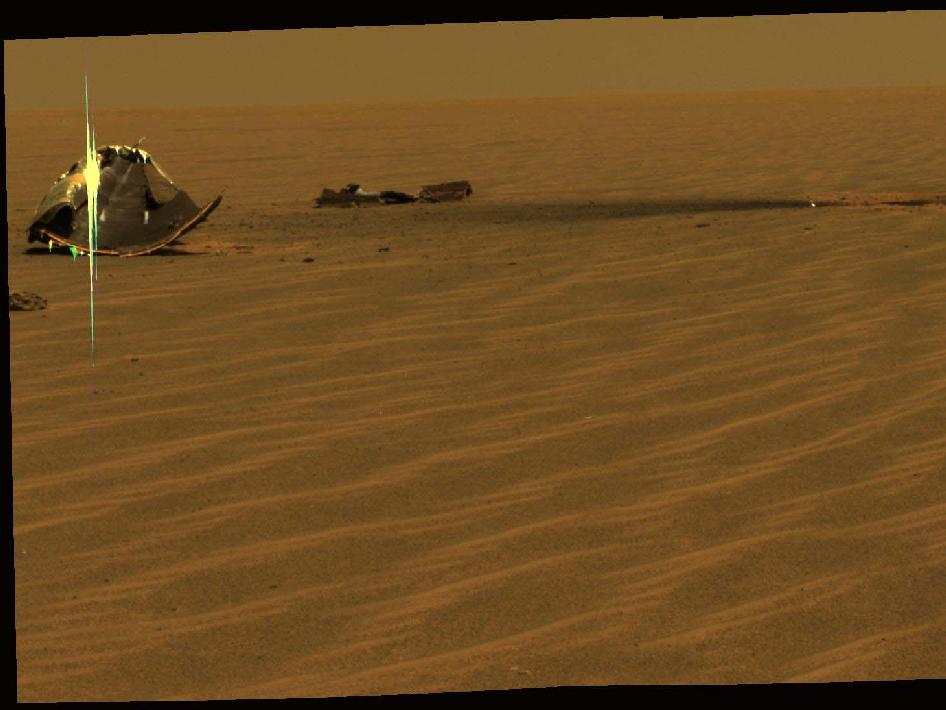 |
| “Every one of us is, in the cosmic perspective, precious. If a human disagrees with you, let him live. In a hundred billion galaxies, you will not find another.” | |
|
https://www.youtube.com/watch?v=hLkC7ralR30 "Those worlds in space are as countless as all the grains of sand on all the beaches of the Earth. Each of those worlds is as real as ours. In every one of them, there's a sucsession of incidence, events, occurences which influence its future. Countless worlds, numberless moments, an immensity of space and time. And our small planet, at this moment, here we face a critical branch-point in the history. What we do with our world, right now, will propagate down through the centuries and powerfully affect the destiny of our descendants. It is well within our power to destroy our civilization, and perhaps our species as well. If we capitulate to superstition, or greed, or stupidty we can plunge our world into a darkness deeper than time between the collapse of classical civilization and the Italian Renaissaince. But, we are also capable of using our compassion and our intelligence, our technology and our wealth, to make an abundant and meaningful life for every inhabitant of this planet. To enhance enormously our understanding of the Universe, and to carry us to the stars." Carl Sagan explains the immensity of space and time. This clip is from Carl Sagan's Cosmos episode 8, "Journeys in Space and Time." |
|
 |
|
| “If you wish to make an apple pie from scratch, you must first invent the universe.” | |
| “What an astonishing thing a book is. It's a flat object made from a tree with flexible parts on which are imprinted lots of funny dark squiggles. But one glance at it and you're inside the mind of another person, maybe somebody dead for thousands of years. Across the millennia, an author is speaking clearly and silently inside your head, directly to you. Writing is perhaps the greatest of human inventions, binding together people who never knew each other, citizens of distant epochs. Books break the shackles of time. A book is proof that humans are capable of working magic." | |
| “Books permit us to voyage through time, to tap the wisdom of our ancestors. The library connects us with the insight and knowledge, painfully extracted from Nature, of the greatest minds that ever were, with the best teachers, drawn from the entire planet and from all our history, to instruct us without tiring, and to inspire us to make our own contribution to the collective knowledge of the human species. I think the health of our civilization, the depth of our awareness about the underpinnings of our culture and our concern for the future can all be tested by how well we support our libraries.” | |
 |
“The Cosmos is all that is or was or ever will be. Our feeblest contemplations of the Cosmos stir us -- there is a tingling in the spine, a catch in the voice, a faint sensation, as if a distant memory, of falling from a height. We know we are approaching the greatest of mysteries.” |
| “The size and age of the Cosmos are beyond ordinary human understanding. Lost somewhere between immensity and eternity is our tiny planetary home. In a cosmic perspective, most human concerns seem insignificant, even petty. And yet our species is young and curious and brave and shows much promise. In the last few millennia we have made the most astonishing and unexpected discoveries about the Cosmos and our place within it, explorations that are exhilarating to consider. They remind us that humans have evolved to wonder, that understanding is a joy, that knowledge is prerequisite to survival. I believe our future depends on how well we know this Cosmos in which we float like a mote of dust in the morning sky.” | |
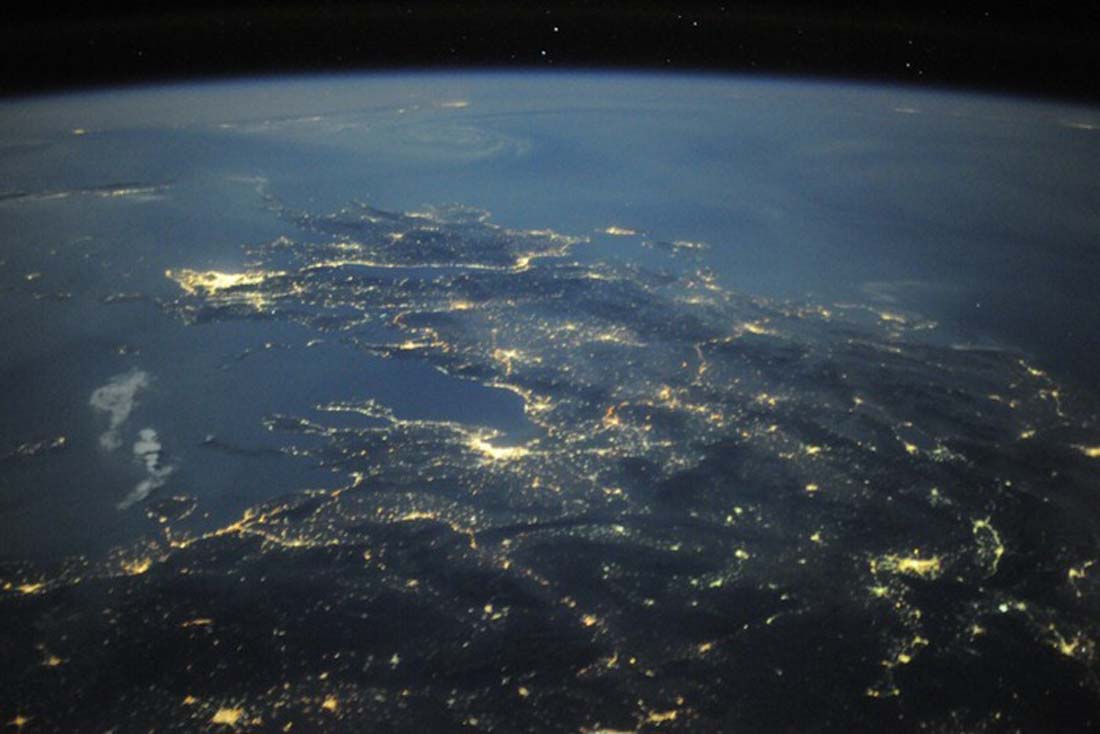 |
“The surface of the Earth is the shore of the cosmic ocean. On this shore, we've learned most of what we know. Recently, we've waded a little way out, maybe ankle-deep, and the water seems inviting. Some part of our being knows this is where we came from. We long to return, and we can, because the cosmos is also within us. We're made of star stuff. We are a way for the cosmos to know itself.” |
| “Atoms are mainly empty space. Matter is composed chiefly of nothing.” | |
| “We inhabit a universe where atoms are made in the centers of stars; where each second a thousand suns are born; where life is sparked by sunlight and lightning in the airs and waters of youthful planets; where the raw material for biological evolution is sometimes made by the explosion of a star halfway across the Milky Way; where a thing as beautiful as a galaxy is formed a hundred billion times - a Cosmos of quasars and quarks, snowflakes and fireflies, where there may be black holes and other universe and extraterrestrial civilizations whose radio messages are at this moment reaching the Earth. How pallid by comparison are the pretensions of superstition and pseudoscience; how important it is for us to pursue and understand science, that characteristically human endeavor. ” | |
 |
|
| “Science cuts two ways, of course; its products can be used for both good and evil. But there's no turning back from science. The early warnings about technological dangers also come from science.” | |
| “The nitrogen in our DNA, the calcium in our teeth, the iron in our blood, the carbon in our apple pies were made in the interiors of collapsing stars. We are made of starstuff.” | |
| “The vast distances that separate the stars are providential. Beings and worlds are quarantined from one another. The quarantine is lifted only for those with sufficient self-knowledge and judgment to have safely traveled from star to star.” | |
| “Our planet is a lonely speck in the great enveloping cosmic dark. In our obscurity, in all this vastness, there is no hint that help will come from elsewhere to save us from ourselves.” | |
| “Observation: I can't see a thing. Conclusion: Dinosaurs.” | |
| "We are a way for the Cosmos to know itself." | |
| “The beauty of a living thing is not the atoms that go into it, but the way those atoms are put together.” | |
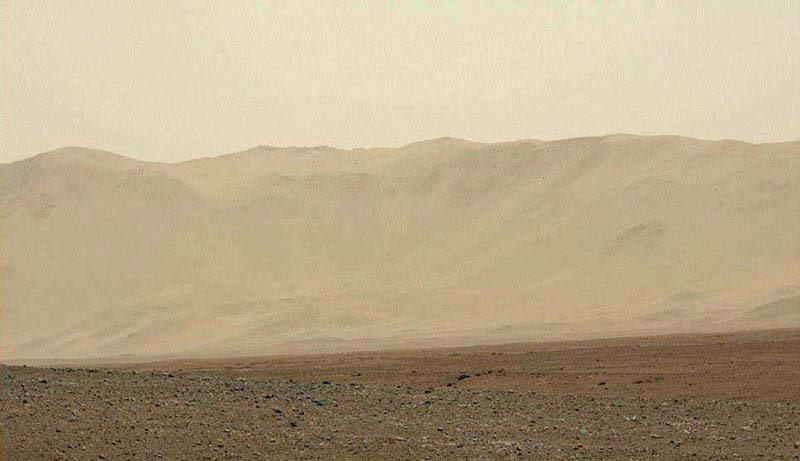 |
|
| “Exploration is in our
nature. We began as wanderers, and we are wanderers still. We have
lingered long enough on the shores of the cosmic ocean. We are ready at
last to set sail for the stars.” Right: Gale Crater, Mars - landing site of Mars Rover Curiosity |
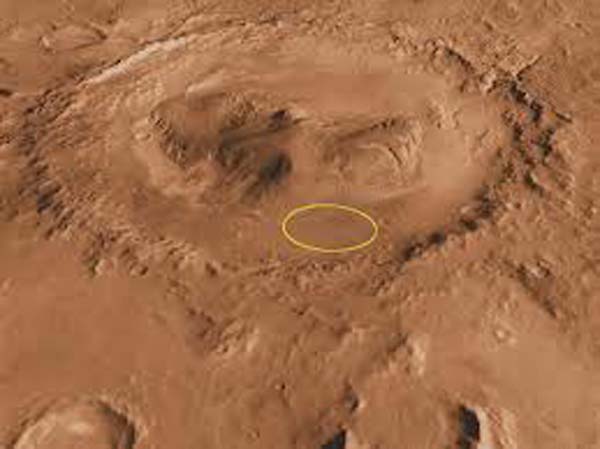 |
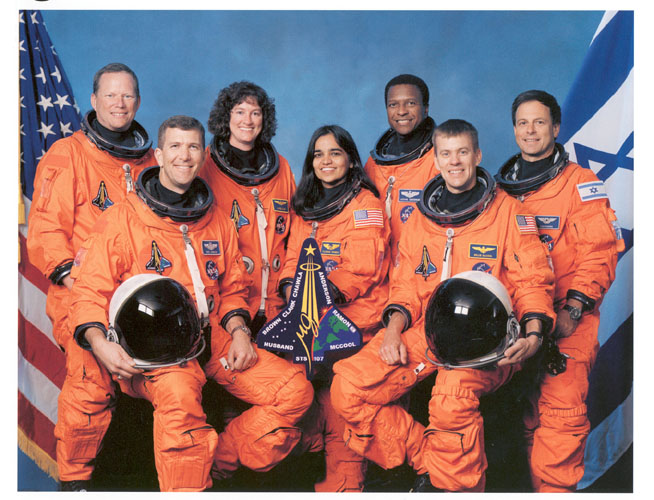 |
“If we are to send people, (into space) it must be for a very good reason - and with a realistic understanding that almost certainly we will lose lives. Astronauts and Cosmonauts have always understood this. Nevertheless, there has been and will be no shortage of volunteers.” |